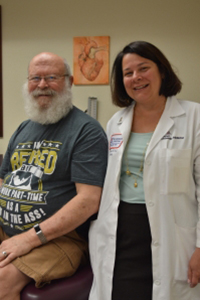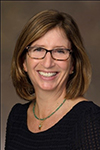Nancy K. Sweitzer, MD, PhD, takes care of patients with advanced heart disease, some who need transplants, some who already have had them, and many who need medications and sometimes implanted devices to mitigate their symptoms and improve their quality of life. Sweitzer, who became chief of the UA Division of Cardiology and director of the UA Sarver Heart Center in 2014, is head of cardiology at Banner – University Medical Center Tucson and an expert in heart failure and transplant cardiology.
This summer, she was named editor of Circulation: Heart Failure, one of the most widely respected cardiology journals. Lo Que Pasa—the newsletter for UA-@-Work, a news website for University of Arizona employees produced by the Office of University Communications—talked with Sweitzer about what it's like to work with some of the best cardiac clinicians and researchers in the world and how cardiology and heart transplantation have evolved over the years.
 Dr. Nancy Sweitzer with Bruce Cameron, a recently enrolled clinical research participant and retired manager of e-Learning Development at the UA College of Nursing.
Dr. Nancy Sweitzer with Bruce Cameron, a recently enrolled clinical research participant and retired manager of e-Learning Development at the UA College of Nursing.
What's it like leading some of the world's best clinical cardiologists?
As the chief of cardiology, I oversee the entire division of clinical cardiology at Banner – University Medical Center Tucson. We have about 30 cardiology faculty here, many world-renowned for their expertise. Our cardiologists are divided into four specialty groups: general noninvasive cardiologists, who take care of any and all heart disease and are often involved in imaging of the heart; interventional cardiologists, who focus on the arteries and blood supply of the heart, and treat patients who are having heart attacks; electrophysiologists, who specialize in the rhythm of the heart; and heart failure and transplant cardiologists, such as me. We have great leaders in each of these areas, and work hand-in-hand with a team approach to patient care.
As the director of the Sarver Heart Center, you focus on advances in research and education when it comes to heart disease. Tell us more about that.
Our research spans basic science; that is, understanding how molecules and cells behave in the development or treatment of heart disease. We also focus on translational science, which is taking some of those basic science discoveries and moving them to the clinic as new and innovative treatments for patients. Once we find that a treatment is helpful for patients, we also look at how we get patients to use it. We do a lot of clinical trials research at the Sarver Heart Center – often large, multicenter projects looking at a new treatment and trying to determine whether this treatment is going to alter the natural course of heart disease.
 Catherine MacDonald is the director of our Cardiovascular Clinical Research program at the Sarver Heart Center and the Division of Cardiology. She and I, in collaboration with the investigators and clinical research staff, have built a research infrastructure that enables our program to conduct clinical trials research with rigorous ethical and quality standards. Currently, we have approximately 50 clinical trials in various stages with half of these actively enrolling participants. Our center is considered a high enroller in many of those trials, thanks to the engagement of our investigators and research coordinators. We're running in the black, which is how clinical research programs should run but very few do.
Catherine MacDonald is the director of our Cardiovascular Clinical Research program at the Sarver Heart Center and the Division of Cardiology. She and I, in collaboration with the investigators and clinical research staff, have built a research infrastructure that enables our program to conduct clinical trials research with rigorous ethical and quality standards. Currently, we have approximately 50 clinical trials in various stages with half of these actively enrolling participants. Our center is considered a high enroller in many of those trials, thanks to the engagement of our investigators and research coordinators. We're running in the black, which is how clinical research programs should run but very few do.
You started your medical training in the 1980s and became board certified in heart failure and transplant cardiology. How has transplantation changed since you began your medical career?
It's evolved from a surgeon-dominated specialty to a multidisciplinary team where every member contributes their expertise to optimize the overall health of the patient. It's a real multidisciplinary team effort where we understand that the involvement of multiple experts leads to far better outcomes. The surgeons are still very involved at the time of the surgery but the heart failure and transplant cardiologists oversee the management of medications for the patients, including lifetime suppression of the immune system. Then there are the nurses and the nurse practitioners who have critical day-to-day relationships with the patients and are absolutely essential in optimizing care, as are social workers, psychologists and psychiatrists, pharmacists and exercise physiologists.
The second big transition, since the early '90s, was the development of mechanical circulatory support. When I started my career, if you had heart failure that was very advanced, and you needed a transplant, we would put you on the transplant list when you were just sick enough, but not actively dying. Finding that sweet spot where the risk of surgery was justified used to be quite difficult. We probably transplanted people who might have kept going with the hearts they had, but we were too nervous about losing the window of opportunity. But since the early 1990s, we have had an evolution in implantable heart pumps that can keep people alive while they are waiting for a transplant. That's what we now call mechanical circulatory support or left ventricular assist devices, LVADs. In my opinion, this has transformed my field. With these pumps, people feel much better, their fitness improves, and when they get transplants they're often in better shape and recovery is often better even though you do have two open heart surgeries. And the rates of death on the transplant list have gone way down. Deaths on the wait list have become quite rare because as people deteriorate we now have this option.
The other thing is that immunosuppression has improved. The medicines are better, we understand how they work and we tailor them more appropriately. So, complications of immunosuppression are going down. Death from rejection has also become quite rare.
What do you love most about your job?
I think I have the best job imaginable. I love being a cardiologist. I feel like this is what I was meant to do. When I have a sick patient, more often than not, I have a sense of what needs to be done to make them better. I develop long-term relationships with patients, because heart failure is a chronic disease. I also love the pursuit of new knowledge in the science I do. I enjoy people, and I like the relationships I have with them. I have an 18-year-old daughter and a 16-year-old son. I'm widowed. My husband developed cancer and died in 2012 of leukemia. I think that experience made me a better doctor. For example, I talk with patients about managing IV care at home, and I've done it. I've had home health care in my home. I've had hospice in my home. I've had firsthand experience.
What do you do to relax?
I'm a good Wisconsin girl, and I like my beer. Pretty much wherever you go now, you can find good beer and try it, and I enjoy doing that. I've always got a knitting project going, too. So, I always have something on my needles, and I’m always looking for a good yarn shop. My mother taught me to knit. When I was in medical school, I sat for hours and hours of lectures. Knitters will tell you they are far more alert when their hands are active. So, I knitted many a sweater during my medical education at the University of Wisconsin, where you need sweaters. My daughter is going to Cornell next year as a freshman, so I think I've got another sweater in my future.
Other UA-@-Work Articles with DOM Themes:
- “If You’re Not Getting 7 Hours of Sleep Each Night, Read This” | Posted May 30, 2017
- “Arthritis Pain Management Lecturer Interview Featured in UA@Work Newsletter” | Posted April 20, 2017
- “UA Grad Student Uses Her Rheumatoid Arthritis to Fuel Research” | Posted July 22, 2016
- “An Evolution of Passion, From Outer Space to the Human Heart with Dr. Julia Indik” | Posted Aug. 18, 2015
- “Sarver Heart Center 'CPR Giant,' Dr. Karl Kern, Working to Improve Cardiac Arrest Survival” | Posted June 5, 2015
ALSO SEE:
“Sweitzer Selected as Editor of the Journal, Circulation: Heart Failure” | Posted June 26, 2017
“Dr. Nancy Sweitzer Inducted into Association of University Cardiologists” | Posted Feb. 9, 2017
“Drs. Lee Ryan, Nancy Sweitzer Speak on ‘Thinking from the Heart’ at Sarver Heart Center 30th Anniversary Lecture, Dec. 14” | Posted Dec. 5, 2016
“Heart Disease and Sleep: Expert Panel Reports That Both Duration and Quality May Impact Heart Health” | Posted Sept. 21, 2016
“Dr. Nancy Sweitzer on ‘Five Ways to Reduce Heart Attack Risk by 80 Percent’” | Posted Feb. 12, 2015
“UAMC Reactivates Heart Transplant Program” | Posted May 28, 2014
“Dr. Nancy K. Sweitzer Named Head of University of Arizona Sarver Heart Center and Division of Cardiology” | Posted Nov. 14, 2013


